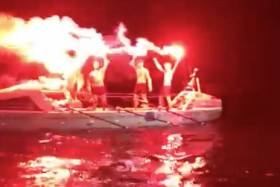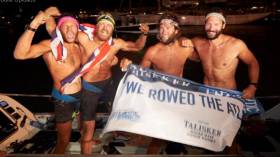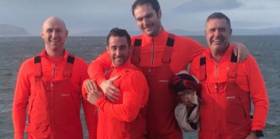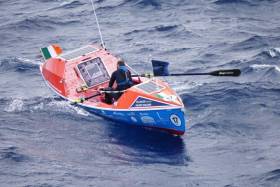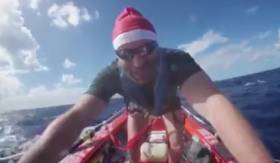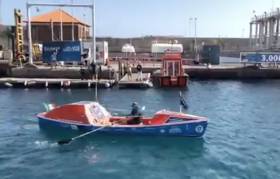Displaying items by tag: Relentless
Relentless Rowers Set New Record
#Rowing: A crew from Cork and Dublin, Relentless, have set a new record for rowing the Atlantic for a Republic of Ireland team. Sean Underwood, Pat O’Connor and Eoin O’Farrell and Thomas Browne crossed the finish line in Antigua this morning after taking just 32 days, 22 hours and four minutes to row from La Gomera in the Canary Islands. They finished sixth in the Atlantic Challenge race, just over three days behind winners The Four Oarsmen, who became the fastest crew ever to row the Atlantic. Ireland had two good placings in the race: on Sunday, Northern Irish crew Home to Portrush finished one place ahead of Relentless in a time of 31 days eight hours and 57 minutes.
Four Oarsmen Win Atlantic Race in Record-Breaking Time
The first boats have finished the Atlantic Challenge ocean rowing race. The Four Oarsmen from Britain won in a record time of 29 days and 15 hours, which the organisers say is the fastest time ever for a row across the Atlantic Ocean. Team Antigua and Swiss Mocean also finished on Saturday in the race from the Canaries to Antigua in the West Indies which is sponsored by Talisker Whisky.
These three fours will be followed in by solo oarsman Mark Slats in Row4Cancer.
Two boats from Ireland are next in line. Home to Portrush is set to take fifth place, most likely arriving on Sunday. Relentless, a four drawn from Cork and Dublin, should finish on Monday or Tuesday.
Northern Irish Crew On Track in Atlantic Rowing Race
#Rowing: Home to Portrush and Relentless, from Cork and Dublin, look set to finish the Atlantic Challenge race in under a week. The Northern Irish crew has taken a clear fifth place and are putting in good mileage each day – they covered 88 nautical miles (163 kilometres) moving into the 27th day of the race from the Canary Islands to Antigua. The crew of George McAlpin, Ally Cooper, Gareth Barton and Luke Baker had 459 nautical miles (850 km) to the finish.
One place behind them lie another four, Relentless. The Cork/Dublin crew have also benefitted from the favourable winds. If they continue their fine progress they will land in English Harbour in Antigua just one day after Home to Portrush, on January 15th.
Solo oarsman Damian Browne has crossed the 1,000 nautical mile mark and has been punching in very steady times after coming through capsizes, an injured face and a damaged steering system. The Galway man, who rows as Gullivers Travels, is projected to finish on Valentine’s Day, February 14th.
Battling Browne Back on Track in Atlantic Row
#Rowing: Damian Browne is back on track in the Atlantic Challenge rowing race. The solo oarsman covered 36 nautical miles (67 km) in the 24 hours to midday on Saturday and heads into the third week of the race from the Canaries to Antigua with a good chance of bettering his 20th place by overtaking some of the pairs. Browne, who competes as Gullivers Travels, was hurt during a set of capsizes just after Christmas but vowed to race on.
Near the head of the 21 boats which are still in the race, Relentless, from Cork and Dublin, and Home to Portrush have swapped places. Both are fours. The Northern Ireland crew covered a remarkable 74 nautical miles (137 km) in the day to midday Saturday and took over in fifth from Relentless, which has taken a more southerly route. The leading crew is the Four Oarsmen, with Team Antigua third. Solo oarsman Mark Slats in Row for Cancer holds on to third. Swiss Mocean, which is also taking a southerly course, lies fourth.
Christmas Cheer for Irish Atlantic Rowers
#Rowing: Christmas has been productive for the Relentless and Gullivers Travel crews taking part in the Atlantic Challenge rowing race. The four-man Relentless crew covered 84 nautical miles (156 kilometres) in the 24 hours to 4pm on St Stephen’s Day. They had rowed 993 nautical miles, and are set to pass the psychologically important 1,000 nautical-mile staging post today. They stand fourth of the fours and fifth overall.
Damian Browne, the solo oarsman who rows as Gullivers Travels, posted a Facebook message on Christmas Day. After tricky times early in the race he has locked in a steady race rhythm. He is 17th of the 21 boats at sea in the race from the Canary Islands to Antigua. Two crews, Team O2 and Team Tenzing had to be rescued in recent days after capsizes. The race organisers report that all the rowers are well.
Home to Portrush, a four, stands seventh overall.
Irish On Track in Ocean Rowing Race
#Rowing: Irish boats are making progress in the Atlantic Rowing Race. Damian Browne, who was tested by difficult conditions and seasickness in the first two days, reported on his Facebook page that he has recovered. By 6pm on Monday he had rowed 154 nautical miles (285 kilometres) of the 2,700 nm/5,000 km journey from the Canary Islands to Antigua.
Relentless, the Cork/Dublin four, were making good speed closer to the head of the field. They were adjudged to be sixth overall. Home to Portrush, tracking further south, placed eighth.
Irish Battle Through Illness and High Winds in Ocean Race
#Rowing: Irish crews competing in the Atlantic Challenge race from the Canaries to Antigua have had to battle seasickness and strong winds in the first two days. Relentless, a four, and Gullivers Travels (crewed by Damian Browne) both started well. However, Browne had to deploy the para anchor and was very disappointed with his progress in the first 24 hours when he struggled with blisters, cramps and dehydration. Relentless were reported to have deployed an emergency beacon, though this was apparently done inadvertently.
The crews were showing steady progress on Saturday, as was the third boat from Ireland, Home to Portrush, which has taken a more southerly course.
Irish Crews Set off on Atlantic Rowing Race
#OceanRowing: Damian Browne has just set off to row the Atlantic. The former professional rugby player, in his boat Darien, left today from La Gomera in the Canary Islands to embark on the Atlantic Challenge race to Antigua. The fours, Relentless, from Cork and Dublin, and Home to Portrush, went off before solo oarsman Browne, who was the last of the 25 boats to leave today.
The start of the race had been delayed for two days because of high winds.


























